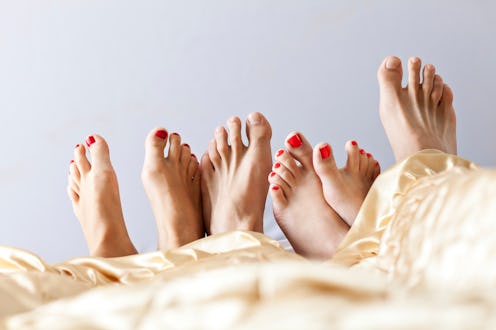Sex & Relationships
"I Haven't Decided How Cautious I Need To Be": Coronavirus' Impact On Poly Relationships

In a world dictated by "social distancing," a well-meaning elbow bump can be as a heartfelt as a big, bear hug. Couples quarantined together are practicing patience, whereas those separated are logging a little extra screen time. And for those participating in non-monogamy or currently seeing more than one person, coronavirus is impacting polyamorous relationships in a multitude of ways, from carving out time for TLC to prolonging rendezvouses.
According to Dr. Natasha Bhuyan, MD at One Medical, any extended contact with others can increase the risk of contracting or spreading the virus for everyone — not just people dating multiple partners.
But for Viv, 27, an office admin from Atlanta who is in a long-term relationship with a nesting partner (aka a partner they live with) and dating another partner, self-quarantining may provide a little much-appreciated time to focus on dating. "Now that virtually all group gatherings are canceled, I may have more time for my partners," they tell Bustle. "I like long phone calls and texting convos, and sexting is something that has been a lot of fun in the past, so I imagine I'll be doing more of that."
Lachlan, 25, an art handler from Pittsburg who has a primary partner in their city and another partner that's long-distance, tells Bustle that they feel confident that they can maintain intimacy by connecting online. "I feel it’s not going to impact my primary relationship, and my other boo lives in California, so our relationship is mainly digital already," they say.
I haven't decided how cautious I need to be about hanging out with her yet.
If you're currently living with multiple partners, experts say it's important to practice general safety precautions ( like you would if you lived with roommates, family members, or literally anyone else). In addition to washing your hands frequently, not touching your face, and limiting non-essential travel, if you or the people you live with are showing symptoms, Dr. Bhuyan stresses the importance of self-isolating within your home.
"For those who are in a home with someone who might have coronavirus, the person with symptoms should wear a mask to limit droplet transmission," Dr. Bhuyan says. "Additionally, if they ever cough, they should use a tissue and immediately discard it in the trash."
While you may love all your partners equally, if one person is more at risk to contract the virus than you or your other partners, Dr. Bhuyan suggests practicing greater social-distancing from them specifically. For Charlie, 31, a polyamorous filmmaker from Ohio, that might mean limiting contact with one of his partners, who has been traveling in the UK, for the time being. "I haven't decided how cautious I need to be about hanging out with her when she returns yet," he tells Bustle.
Moreover, if one of your partners has diabetes or takes a medication that affects their immune system, Dr. Bhuyan says their body may not be able to fight infections as effectively as others. While you may want to spend equal amounts time with all your partners, if you're quarantined with one and not the other, or one is at higher risk of getting sick, consider sending them a personalized playlist on Spotify or getting groceries delivered to their house instead of swinging by. It's for everybody's healthy and safety — including theirs.
If you think you’re showing symptoms of coronavirus, which include fever, shortness of breath, and coughing, call NHS 111 in the UK or visit the CDC website in the U.S. for up-to-date information and resources. You can find all Bustle’s coverage of coronavirus here, and UK-specific updates on coronavirus here.
Experts:
Dr. Natasha Bhuyan, MD at One Medical
This article was originally published on